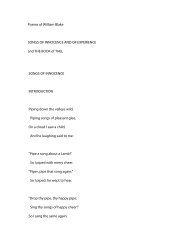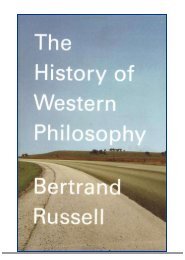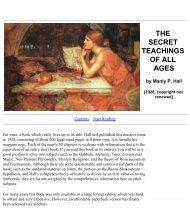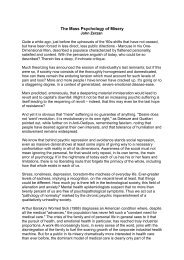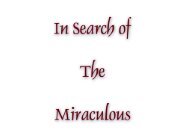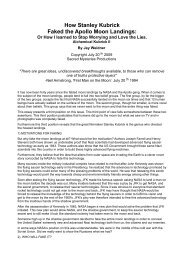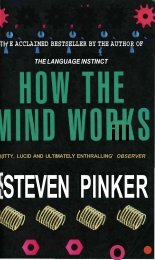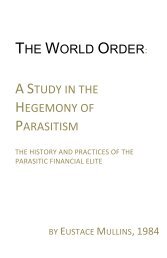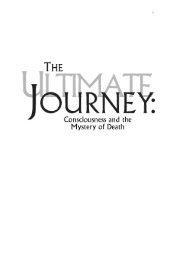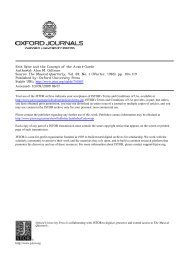perspective, had become common property and were evident in theincreasing prevalence of landscape painting throughout Europe. We shallonly mention a few of the great European masters who repeatedly took upthe question of the perception and depiction of space in landscape:Altdorfer, van Goyen; Poussin, Claude Lorrain; Ruysdael, Magnasco;Watteau, Constable, Corot, Caspar David Friedrich; Millet, Courbert;Manet,Monet, Renoir, and finally, van Gogh and Rousseau.Space is the insistent concern of this era. In underscoring this assertion,we have relied only on the testimony of its most vivid manifestation, thediscovery of perspective. We did, however, mention in passing that at thevery moment when Leonardo discovers space and solves the problem ofperspective, thereby creating the possibility for spatial objectification inpainting, other events occur which parallel his discovery. Copernicus, forexample, shatters the limits of the geocentric sky and discoversheliocentric space; Columbus goes beyond the encompassing Oceanosand discovers earth's space: Vesalius, the first major anatomist, bursts theconfines of Galen's ancient doctrines of the human Body and discovers thebody's space;Harvey destroys the precepts of Hippocrates' humoralmedicine and reveals the circulatory system. And there is Kepler, who bydemonstrating the elliptical orbit of the planets, overthrows antiquity'sunperspectival world-image of circular and flat surfaces (a view still heldby Copernicus) that dated back to Ptolemy's conception of the circularmovement of the planets.It is this same shape - the ellipse - which Michelangelo introduces intoarchitecture via his dome of St. Peter’s, which is elliptical and not round orsuggestive of the cavern or vault. Here, too, we find a heightened sense ofspatiality at the expense of antiquity's feeling of oceanic space. Galileopenetrates even deeper into space by perfecting the telescope, discoveredonly shortly before in Holland, and employing it for astronomical studies —preparations for man's ultimate conquest of air and suboceanic space thatcame later and realized the designs already conceived and drawn up inadvance by Leonardo.This intense desire evident at the turn of the sixteenth century to conquerspace, and to break through the flat ancient cavern wall, is exemplified notonly by he transition from sacred fresco painting to that on canvas, buteven by the most minute and mundane endeavours. It was around thistime that lace was first introduced; and here we see that even the fabriccould no longer serve merely as a surface, but had to be broken open, asit were, to reveal the visibility of the background or substratum. Nor is itaccidental that in those years of the discovery of space via perspective,the incursions into the various spatial worlds mentioned above brought onwith finality a transformation of the world into a spatial, that is, a sectoredworld. <strong>The</strong> previous unity breaks apart; not only is the world segmentedand fragmented, but the age of colonialism and the other divisions begins:schisms and Splits in the church, conquests and power politics, unboundedtechnology, and all types of emancipations.24
<strong>The</strong> over-emphasis an space and spatiality that increases with everycentury since 1500is at once the greatness as well as the weakness ofperspectival man. His over-emphasis on the "objectively" external, aconsequence of an excessively visual orientation, leads not only torationalization and haptification but to an unavoidable hypertrophy of the"I," which is in confrontation with the external world. This exaggeration ofthe "I" amounts to what we may call an ego-hypertrophy: the "I" must beincreasingly emphasized, indeed over-emphasized in order for it to beadequate to the ever-expanding discovery of space. At the same time, theincreasing materialization and haptification of space which confronts theego occasions a corresponding rigidification of the ego itself. <strong>The</strong>expansion of space brings on the gradual expansion and consequentdisintegration of the "I" on the one hand, preparing favorablecircumstances for collectivism. On the other hand, the haptification ofspace rigidifies and encapsulates the "I," with the resultant possibility ofisolation evident in egocentrism.As to the perspectival attitude, it is thus possible to maintain that thedomination of space which results from an extreme perspectivizationupsets and unbalances the "I." In addition, the one-sided emphasis onspace, which has its extreme expression in materialism and naturalism,gives rise to an ever-greater unconscious feeling of guilt about time, theneglected component of our manifest world.As we approach the decline of the perspectival age, it is our anxiety abouttime that stands out as the dominant characteristic alongside our evermore absurd obsession with space. It manifests itself in various ways, suchas in our addiction to time. <strong>Ever</strong>yone is out to "gain time," although thetime gained is usually the wrong kind: time that is transformed into avisible multiplication of spatially fragmented "activity," or time that onehas "to kill." Our time anxiety shows up in our haptification of time(already heralded by Pope Sabinus' hourly bell-ringing) and is expressed inour attempt to arrest time and hold onto it through its materialization.Many are convinced that "time is money," although again this is almostinvariably falsified time, a time that can be turned into money, but nottime valid in its own right. A further expression of man's currenthelplessness in the face of time is his compulsion to "fill" time; he regardsit as something empty and spatial like a bucket or container. devoid of anyqualitative character. But time is in itself fulfilled and not something thathas to be "filled up" or "filled out."Finally, our contemporary anxiety about time is manifest in our flight fromit: in our haste and rush, and by our constant reiteration, "I have no time."It is only too evident that we have space but no time; time has us becausewe are not yet aware of its entire reality. Contemporary man looks fortime, albeit mostly in the wrong place,: despite, or indeed because of hislack of time: and this is precisely his tragedy, that, he spatializes time andseeks to locate it "somewhere." This spatial attachment - in its extremeform a spatial fixation – prevents him from finding an escape from spatialcaptivity. But simple exits and paths are mere Phantoms here, for time is25
- Page 5 and 6: deficient forms which have become a
- Page 7 and 8: they could not reach their intent w
- Page 9 and 10: identity, or with his being equated
- Page 11 and 12: was especially influential on Greek
- Page 13 and 14: anticipated by Pope Sabinus, who in
- Page 16 and 17: discovery of Augustine's words. "I
- Page 18 and 19: concretion of space, our epoch is c
- Page 20 and 21: While plumbing the hidden depths of
- Page 22 and 23: With Leonardo the perspectival mean
- Page 26 and 27: not an avenue. Although man's horiz
- Page 28 and 29: order to obtain a sequential view o
- Page 30 and 31: the truly unrepresentable become ev
- Page 32 and 33: apparent in the development of aper
- Page 34 and 35: characteristics of the structures,
- Page 36 and 37: Structureaugmentation, a loss or a
- Page 38 and 39: "silenced music" of which St. John
- Page 40 and 41: meantime the integral perception an
- Page 42 and 43: homogeneity of the viscera, as well
- Page 44 and 45: Archaic — OriginaryMagicempathy a
- Page 46 and 47: IntegralCreed)Method(Divinity)(Eteo
- Page 48 and 49: that structure itself. Orestes' act
- Page 50 and 51: in its silent meaning, for he dedic
- Page 52 and 53: directed way, and to a mythical dem
- Page 54 and 55: Even though we may be unable to do
- Page 56 and 57: of arational possibilities which ar
- Page 58 and 59: chapters 5, 6, and 7, we would like
- Page 60 and 61: presupposes in any event the mental
- Page 62 and 63: capability is being formed in him w
- Page 64 and 65: At the moment when consciousness be
- Page 66 and 67: temporal aspects enumerated. We are
- Page 68 and 69: understanding the phenomenon of tim
- Page 70 and 71: temporal forms which co-constitute
- Page 72 and 73: crystallizing in a new perception o
- Page 74 and 75:
dream-like and somnolent aspects an
- Page 76 and 77:
ealization now manifesting itself a



